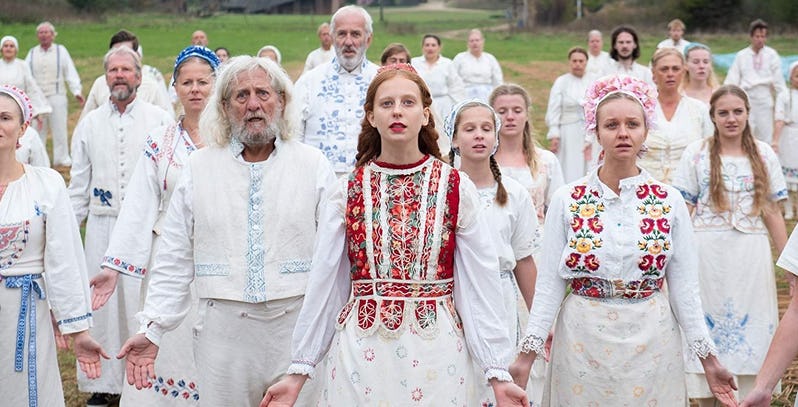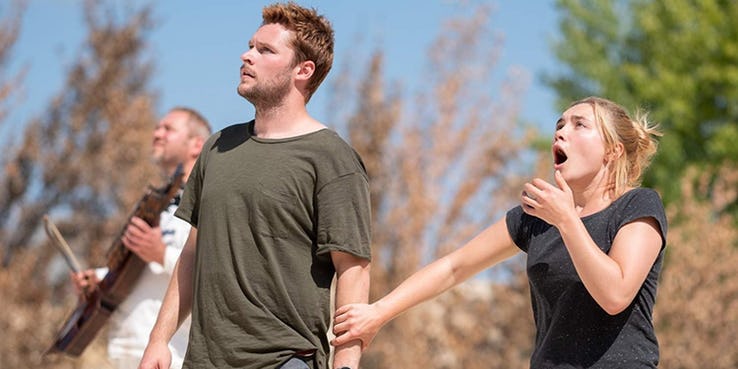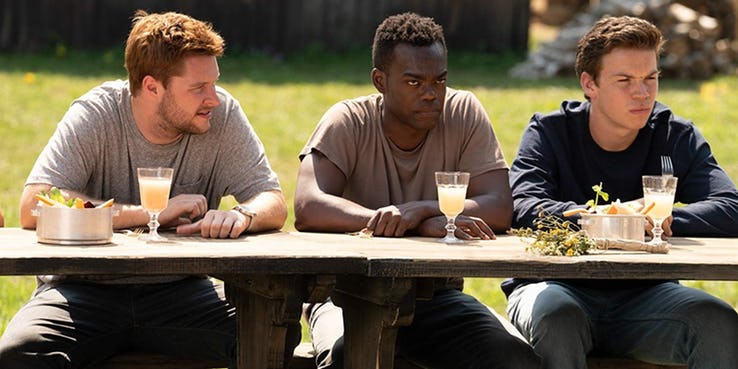
Midsommar Review: The Director of Hereditary Goes Full Wicker Man
Our Review TV Show has returned as ResSOX. Watch it as SOX TV and nor write the retell.
MIDSOMMAR IS A MIXED BAG THAT BLENDS UNSETTLING HORROR WITH BIZARRE COMEDY, RESULTING IN A FILM THAT’S EQUAL PARTS FASCINATING AND FRUSTRATING.
Hereditary filmmaker Ari Aster is back with his second feature, Midsommar, and it’s as messed up as his breakout effort… if also simply messier in general. Aster has long described the project as a breakup drama disguised as a folk horror movie, much in the same way that Hereditary is a familial tragedy that’s been repackaged as a supernatural psycho-thriller. It’s an apt description too; Aster’s first two films feels like companion pieces to one another, thematically, and have many of the same strengths and flaws, along with some new issues in the case of his latter work. Midsommar is a mixed bag that blends unsettling horror with bizarre comedy, resulting in a film that’s equal parts fascinating and frustrating.
Story-wise, Midsommar revolves around Christian (Jack Reynor) and Dani (Florence Pugh), a young American couple who’re on the rocks; Christian has been wanting out of their relationship for almost a year but doesn’t want to be the one to end things, whereas Dani is continually finding new ways to blame herself for Christian’s distant and unsupportive behavior. After Dani suffers a horrifying personal tragedy, Christian invites her on a trip with his friends Mark (Will Poulter), Josh (William Jackson Harper), and Pelle (Vilhelm Blomgren) to go visit Pelle’s home village in Sweden and attend a mid-summer festival that they only hold every ninety years. And while the event seems a bit peculiar, if otherwise harmless, at first, Dani, Christian, and the others soon discover just how violent and disturbing this “celebration” truly is.

Aster’s Midsommar script is at its strongest when it’s focused on Christian and Dani’s crumbling relationship, as opposed to the madness that ensues when they pair are vacationing (if that’s the right word for it) in Europe. The film hits the ground running and brings Hereditary to mind in the way that it uses long takes and moody direction to further emphasize the sense of discomfort in the couple’s interactions with one another, even before the harrowing incident that sets the larger plot in motion. Speaking of which: Aster once again proves that he has a knack for portraying the sheer impact and pain of emotional trauma with his filmmaking here, and really allows viewers to feel the weight of Dani’s loss before pushing ahead with the rest of the story. And much like Hereditarywas a showcase for Toni Collette, Midsommar gives Pugh room to truly shine as an actor and deliver a dynamic performance that traverses just about every emotion across the spectrum.
Unfortunately, Midsommar begins to run into trouble after that. By the time that Dani, Christian, and the others make their way to Pelle’s village, the film starts to devolve into more of a stylish, but nevertheless predictable horror-thriller full of characters ignoring the blatant warning signs that something’s not right, and continuing to act implausibly calm when people start mysteriously vanishing after the increasingly aberrant mid-summer festivities get underway. It doesn’t help that most of the supporting players end up being pretty two-dimensional (Harper, for example, is basically playing Chidi from The Good Place, but with less personality), and largely seem to exist to be picked off on the way to the third act. It’s also hard to not be reminded of The Wicker Man in this portion of the movie; as obvious as the comparison is, the horror classic was clearly an influence on Pelle’s village and their deranged rituals and customs. Between that and its similarities to P.T. Anderson’s The Master (another fever dream of a story about a damaged person who gets mixed up with a cult), Midsommarends up feeling more derivative than Hereditary overall.

What’s interesting, though, is that Midsommar‘s core themes still land when they come back into focus in the third act; it’s the indulgent weirdness in the build-up that dilutes the movie’s overarching impact. Pugh deserves credit for being the glue that holds the film together throughout its rough patches, and delivering a performance that constantly reminds viewers: all the horror movie outlandishness aside, Midsommar is ultimately a story about a person who’s struggling to let go of a toxic relationship and starts clinging to it even harder, following a traumatic turn of events. It also helps that Aster’s script (generally) sees the twisted humor in much of what transpires in the story and embraces it, rather than trying to pretend that it doesn’t exist. And of course, the film is beautifully shot by Aster and his Hereditary DP Pawel Pogorzelski; their usage of unnaturally sunny lighting and colors lends the whole thing an appropriately phantasmagoric, dream-like quality.
In the end, Aster doesn’t suffer a sophomore slump with Midsommar, but he doesn’t hit one out of the park either. Instead, the film amounts to an ambitious but sloppy offering that lands somewhere near the middle on the quality scale. Those who loved Hereditary and/or are fans of Pugh’s work will probably enjoy this one more than others, and may be more forgiving of its shortcomings as a whole. On the other hand, those who found Aster’s feature debut to be mostly off-putting and depraved for its own sake will probably want to take a pass on this one. Either way, it’s hard to imagine that this one won’t end up going down as the most WTF wide release of 2019.
TRAILER
Midsommar is now playing in U.S. theaters nationwide. It is 140 minutes long and is rated R for disturbing ritualistic violence and grisly images, strong sexual content, graphic nudity, drug use and language.
Let us know what you thought of the film in the comments section!
